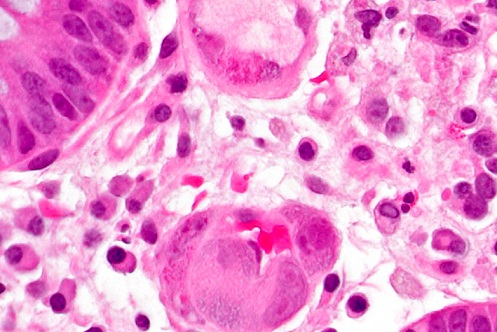Scientists in Belgium Find That Cytomegalovirus DNAemia Drives COVID-19 Severity
Nikhil Prasad Fact checked by:Thailand Medical News Team Jan 27, 2025 11 months, 5 days, 11 hours, 44 minutes ago
Medical News: Understanding Cytomegalovirus and its Impact on Severe COVID-19
A recent study has highlighted a concerning link between cytomegalovirus (CMV) DNAemia and severe SARS-CoV-2 pneumonia in critically ill patients requiring invasive mechanical ventilation (IMV). Conducted by researchers from the Critical Care Department at Cliniques Universitaires Saint-Luc, Université Catholique de Louvain, Brussels, Belgium, and the Department of Critical Care Medicine at CHR Mons-Hainaut, Mons, Belgium, the study sheds light on a viral complication that may influence patient outcomes in intensive care units (ICUs).
 Scientists in Belgium Find That Cytomegalovirus DNAemia Drives COVID-19 Severity
Key Objectives of the Study
Scientists in Belgium Find That Cytomegalovirus DNAemia Drives COVID-19 Severity
Key Objectives of the Study
Cytomegalovirus (CMV) reactivation is not a new phenomenon in critically ill patients. However, its clinical significance, particularly among those with severe COVID-19 pneumonia, remains an area of ongoing investigation. This
Medical News report delves into findings from a retrospective cohort study that assessed the prevalence of CMV DNAemia in critically ill COVID-19 patients and its impact on clinical outcomes. Researchers analyzed data from 135 patients admitted to the ICU with confirmed SARS-CoV-2 pneumonia who required mechanical ventilation between March 2020 and January 2022.
The study aimed to compare the clinical characteristics and outcomes of patients with and without CMV DNAemia. Factors such as ICU length of stay (LOS), hospital LOS, duration of mechanical ventilation, and mortality were evaluated to assess whether CMV DNAemia influences recovery trajectories in these high-risk patients.
Study Methodology and Design
The retrospective analysis included only patients who underwent at least one CMV DNA test during their ICU stay. CMV DNAemia was defined as a blood viral load exceeding 500 IU/mL, a threshold commonly used in related research. Testing was performed based on clinical suspicion, including prolonged ICU stays, worsening clinical conditions, or laboratory abnormalities suggestive of viral reactivation.
Quantitative polymerase chain reaction (PCR) testing was used to measure CMV levels, with the highest recorded values analyzed for each patient. Baseline patient data, including age, gender, comorbidities, and disease severity scores (such as APACHE II and SOFA scores), were also collected. Advanced statistical models, including Cox regression analyses, were applied to determine independent factors associated with CMV reactivation.
Key Findings and Results
The study revealed that 22% (30 out of 135) of the patients developed significant CMV DNAemia during their ICU stay. These patients experienced markedly worse clinical trajectories compared to those without CMV reactivation. Key findings include:
-Prolonged ICU and Hospital Stays: Patients with CMV DNAemia had a median ICU stay of 68 days compared to 23 days for those without reactivation. Similarly, their median hospital stay
was 70 days compared to 31 days in the CMV-negative group.
-Extended Ventilation Requirements: The duration of invasive mechanical ventilation was significantly longer in patients with CMV DNAemia, with a median of 62.5 days versus 20 days in CMV-negative patients.
-Association with Corticosteroid Use: The study identified a strong association between dexamethasone use and the occurrence of CMV DNAemia. Patients who received dexamethasone had a higher risk of reactivation, with an adjusted hazard ratio of 4.23.
-Mortality Rates: Interestingly, there was no significant difference in ICU mortality between patients with and without CMV DNAemia. Mortality rates stood at 56.7% in the CMV-positive group versus 64.8% in the CMV-negative group.
Broader Implications of the Findings
These findings underscore the potential role of CMV reactivation as a marker of disease severity rather than a direct driver of mortality. The link between prolonged ICU stays and CMV DNAemia suggests that patients experiencing severe or prolonged critical illness are more vulnerable to viral reactivation due to immunosuppression.
Moreover, the study highlights the challenges in managing CMV reactivation in critically ill COVID-19 patients. While some patients were treated with antiviral therapies such as valganciclovir, the study did not observe a significant mortality benefit associated with treatment. This raises important questions about the clinical utility of preemptive or therapeutic antiviral interventions in such cases.
Discussion and Clinical Relevance
The researchers noted that CMV reactivation - characterized by measurable DNAemia - is a common occurrence in ICU patients with severe viral pneumonia. However, diagnosing and managing CMV reactivation remains complex, particularly given the overlap of symptoms with other critical illnesses and the risks associated with invasive diagnostic procedures.
Corticosteroid therapy, a mainstay treatment for severe COVID-19, appears to play a dual role. While it effectively mitigates the inflammatory damage caused by SARS-CoV-2, it also predisposes patients to opportunistic infections, including CMV. This underscores the need for tailored treatment approaches that balance the benefits of immunosuppression with the risks of viral reactivation.
Conclusion
This study provides valuable insights into the prevalence and clinical implications of CMV DNAemia in critically ill COVID-19 patients requiring mechanical ventilation. While CMV reactivation was not associated with increased mortality, its impact on ICU and hospital stays, as well as ventilation requirements, highlights its role as a complicating factor in patient recovery. These findings emphasize the need for heightened awareness and targeted research to address viral reactivation in this vulnerable population.
Future studies should focus on establishing standardized screening protocols for CMV reactivation and evaluating the efficacy of antiviral therapies in reducing morbidity and improving recovery outcomes. By better understanding the interplay between CMV and critical illness, clinicians can develop more effective strategies to optimize care for patients with severe COVID-19.
The study findings were published in the peer-reviewed journal: Infectious Disease Reports.
https://www.mdpi.com/2036-7449/17/1/8
For the latest COVID-19 News, keep on logging to Thailand
Medical News.
Read Also:
https://www.thailandmedical.news/news/study-finds-a-hidden-crisis-of-rising-threat-of-fungal-coinfections-among-post-covid-patients-in-africa
https://www.thailandmedical.news/news/doctors-warn-that-hmpv-can-trigger-deaths-in-children-with-covid-19
https://www.thailandmedical.news/news/hmpv-enhances-coinfections-by-opportunistic-bacterial-pathogens-via-the-suppression-of-il-1beta-transcription
https://www.thailandmedical.news/news/doctors-from-texas-warn-that-post-covid-19-individuals-are-more-susceptible-to-coccidioidomycosis-infections
https://www.thailandmedical.news/articles/coronavirus
